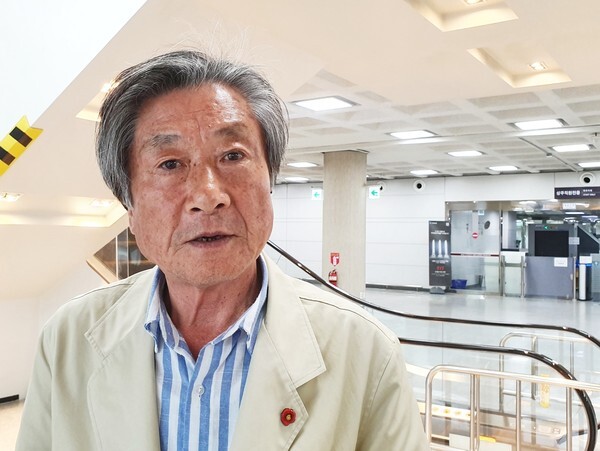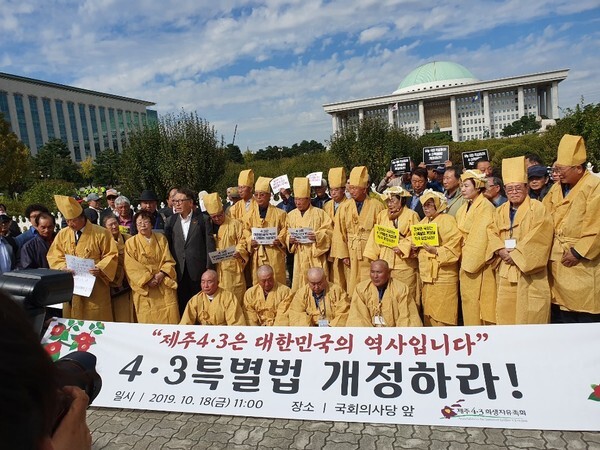hankyoreh
Links to other country sites 다른 나라 사이트 링크
[Interview] Family members of Jeju April 3 victims demand amendment of special act in Ntl. Assembly

“The family members are desperate. The people who lived through the hardship of Jeju April 3 are now in their 90s and suffering from the aftereffects. Their family members are insistent that a restoration of their reputation and government compensation need to take place while they are still alive. This is why the amendment to the Jeju April 3 Special Act needs to pass the National Assembly.”
Song Seung-moon, the 70-year-old chairman of the Association for the Bereaved Families of April 3 Victims, has been traveling back and forth between Seoul and Jeju this year to fight for the National Assembly’s passage of an amendment to the Jeju April 3 Special Act. A restoration of the reputations of the victims and their family members are urgent, alongside government compensation, he explained. Twice on June 28 and Oct. 18, members of the association held ceremonies in mourning clothes (for funerals) in front of the National Assembly to demand that the National Assembly pass the amendment. Some of the family members shaved their heads in protest. Two-person relay demonstrations in front of the National Assembly are set to begin next month.
On the morning of Oct. 26, Song was at Jeju Airport preparing to depart for a gathering of Jeju April 3 family members in Seoul, which is to be held at the Sejong Center to enlist the support of Jeju April 3 family members in Seoul for the relay demonstrations.
“There are two reasons we are putting on mourning clothes and calling for the National Assembly to pass the Jeju April 3 Special Act within the year,” he explained. “The first is that the family members are holding rituals to pray for the spirits of those who have passed away, and the second is that we were holding a ceremony in front of the National Assembly to give support to their descendants so that the Jeju April 3 Special Act can be passed within the year.”
A living testament to April 3 tragedySong, who was born in an internment camp during the events of Jeju April 3, is himself a living testament to the suffering of that episode. His mother Moon Soon-seon, now 90, gave birth to him at a Jeju boat factory where residents were interned after defecting in June 1949. His grandmother was also interned with them. Meeting with a reporter last year, Moon said, “My mother-in-law [Song’s grandmother] called over another woman in the same room at the camp, and she wrapped her arms around my waist as Seung-moon came out.” Most of the others in the room had no idea she had given birth.
Song’s grandmother was taken to a prison in Jeju with her four-year-old son (Song’s uncle), where she served a 10-month sentence. Unaware of why she was even in the Jeju prison, the grandmother would learn only later that her name was mistakenly reported by the prison officer. Her son passed away from measles while they were inside. Song’s father was taken on a truck to Jeongtteureu Airfield (now Jeju Airport) around October 1949; his whereabouts remain unknown. Every time there is digging for remains at Jeju Airport, Song has visited to observe the exhumation. He has even undergone DNA testing, but his father’s remains have yet to be located.
“Two times this year, I have put on funeral clothes to protest in front of the National Assembly, but there has been no response from politicians,” Song lamented.
“During the Jeju April 3 commemoration ceremonies, the ruling and opposition party leaders speak as though they will be passing a Jeju April 3 Special Act any day now, but once they return to Seoul they don’t say anything more about it. If anything, I was astonished by the National Assembly members who seem to look at Jeju April 3 through ideologically colored lenses to this day.”

In a retrial last January, 18 survivors of incarceration during the events of Jeju April 3 -- people who were sent to prisons in other parts of South Korea through summary court-martial judgments at the time -- were effectively exonerated. They were also recently awarded criminal compensation. But untold numbers of other victims never had the chance for retrials, having been killed or gone missing in prisons at the time. The number of people imprisoned through military court-martial rulings alone amounts to 2,530.
The major changes in an amendment to the Jeju April 3 Special Act sponsored in the National Assembly in December 2017 by Oh Young-hun, a lawmaker with the Democratic Party, are the nullification of the military court-martial rulings at the time and government compensation to the victims. The family members expect that if the amendment is not passed within the year, it will be automatically discarded once the 20th National Assembly concludes. This is why they are appealing for its National Assembly passage before the end of the year.
As imprisonment survivors have received de facto exonerations in court, more and more Jeju April 3 survivors are requesting retrials. Direct relations in the Council of Family Members of the Jeju April 3 Missing requested retrials in June for 10 people who died or went missing while imprisoned during the events of Jeju April 3. Around 400 people plan to pursue legal action to request additional retrials within the year.
“Some of the family members have said, ‘Imprisonment survivors have received compensation even though they were grateful enough to come back alive. But we haven’t been able to find the remains of our loved ones; we don’t even know the dates of their deaths. So there are a lot of mixed feelings,’” Song explained.
“The association will provide its support for the retrial lawsuits. The imprisonment survivors are being exonerated in the retrials, and the association would come under fire if it didn’t support the suits for the family members’ sake,” he said.
“In the end, we are going to need to resolve this issue and restore the reputations of the victims and their family members with National Assembly passage of a Jeju April 3 Special Act amendment.”
By Huh Ho-joon, Jeju correspondent
Please direct comments or questions to [english@hani.co.kr]

Editorial・opinion
![[Column] Season 2 of special prosecutor probe may be coming to Korea soon [Column] Season 2 of special prosecutor probe may be coming to Korea soon](https://flexible.img.hani.co.kr/flexible/normal/500/300/imgdb/original/2024/0426/3317141030699447.jpg) [Column] Season 2 of special prosecutor probe may be coming to Korea soon
[Column] Season 2 of special prosecutor probe may be coming to Korea soon![[Column] Park Geun-hye déjà vu in Yoon Suk-yeol [Column] Park Geun-hye déjà vu in Yoon Suk-yeol](https://flexible.img.hani.co.kr/flexible/normal/500/300/imgdb/original/2024/0424/651713945113788.jpg) [Column] Park Geun-hye déjà vu in Yoon Suk-yeol
[Column] Park Geun-hye déjà vu in Yoon Suk-yeol- [Editorial] New weight of N. Korea’s nuclear threats makes dialogue all the more urgent
- [Guest essay] The real reason Korea’s new right wants to dub Rhee a founding father
- [Column] ‘Choson’: Is it time we start referring to N. Korea in its own terms?
- [Editorial] Japan’s rewriting of history with Korea has gone too far
- [Column] The president’s questionable capacity for dialogue
- [Column] Are chaebol firms just pizza pies for families to divvy up as they please?
- [Column] Has Korea, too, crossed the Rubicon on China?
- [Correspondent’s column] In Japan’s alliance with US, echoes of its past alliances with UK
Most viewed articles
- 1[Column] Season 2 of special prosecutor probe may be coming to Korea soon
- 2‘We must say no’: Seoul defense chief on Korean, USFK involvement in hypothetical Taiwan crisis
- 3Is N. Korea threatening to test nukes in response to possible new US-led sanctions body?
- 4Division commander ordered troops to enter raging flood waters before Marine died, survivor says
- 5Amnesty notes ‘erosion’ of freedom of expression in Korea in annual human rights report
- 6Is Japan about to snatch control of Line messenger from Korea’s Naver?
- 7No good, very bad game for Korea puts it out of Olympics for first time since 1988
- 8[Editorial] Korea’s surprise Q1 growth requires objective assessment, not blind fanfare
- 9N. Korean delegation’s trip to Iran shows how Pyongyang is leveraging ties with Moscow
- 10Korea’s 1.3% growth in Q1 signals ‘textbook’ return to growth, says government